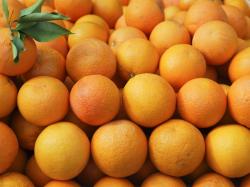Valencia Oranges, Under Siege In California, Fight To Survive
July 8, 2013 | 1 min to read

PAUMA VALLEY, Calif. — The vista from the foothills of Mt. Palomar recalls classic citrus labels, a sea of green dotted with bright orange fruits. Frost-free, with south-facing slopes, pure water and good drainage, this is among the best land in Southern California for growing Valencia oranges and one of the last redoubts for an iconic but besieged crop.
Bob Polito, 62, grows 42 acres of Valencias in Pauma Valley and nearby Valley Center and sells top-quality oranges and juice at the Santa Monica, La Cienega and Venice farmers markets. Easygoing and phlegmatic, he loves the groves he has farmed since 1981 but is pessimistic about his industry. Water cutbacks and sky-high water prices forced him to remove a third of his trees. Next to one of his groves lie rows of tangled debris from dead Valencia trees, uprooted by a neighbor who gave up the fight.
Now Polito fears that huanglongbing, a bacterial disease deadly to trees and spread by a tiny insect called the Asian citrus psyllid, will destroy his groves. The psyllid, first detected in 2008, has spread throughout Southern California; the disease was found in just one tree, in Hacienda Heights last year, but a new infection could be discovered at any time. The best hope for long-term survival is to kill the psyllids, but Polito thinks it's futile to spray his home ranch in Valley Center, where neglected small plantings and backyard trees abound.
To read the rest of the story, please go to: Los Angeles Times
